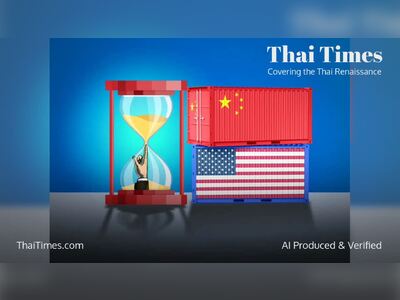
Thailand-EU Free Trade Agreement Set to Transform Trade Relations
The forthcoming Thailand-EU Free Trade Agreement is expected to double trade volume and enhance investment opportunities between Thailand and the European Union.
Negotiations for the Thailand-European Union free trade agreement (FTA) are progressing swiftly, with expectations for its signing by the end of this year.
Analysts anticipate that this development will significantly increase Thailand's trade with the EU, potentially doubling the current levels.
According to independent political and economic expert Somjai Phagaphasvivat, the FTA is expected to eliminate import duties on most products exchanged between Thailand and the 27 member states of the EU, propelling two-way trade forward.
Thailand has previously established a partnership cooperation agreement (PCA) with the EU, which is a crucial precursor to such trade agreements.
Following political turbulence, including a coup in 2014, negotiations had been shelved until Thailand implemented a new constitution and conducted elections, which restored dialogue with the EU.
The current momentum in the negotiations is, in part, bolstered by shifts in global trade dynamics, particularly influenced by U.S. trade policies under former President Donald Trump.
These policies have motivated both the EU and Thailand to explore deeper economic ties to mitigate reliance on trade with the United States.
Historically, Thailand’s absence of an FTA with the EU has placed it at a competitive disadvantage compared to regional peers like Vietnam, which has enjoyed such agreements.
Somjai emphasized that both Thailand and the EU now demonstrate a robust commitment to finalizing the FTA.
While previous negotiations have faced delays due to political landscapes and Thailand's hesitance to address the potential costs associated with an FTA, there is now a clear intention to approach these discussions with a balanced perspective on benefits and repercussions.
Trade with the EU represents approximately 8% of Thailand's global exports, with the country maintaining a trade surplus with the bloc.
EU investments constitute around 15% of Thailand's total foreign direct investment.
Somjai forecasts that, following the FTA's enactment, exports to the EU could expand significantly, citing the Asean Free Trade Area as a successful example that increased export percentages to neighboring Southeast Asian countries substantially.
The FTA is also projected to have a positive impact on the investment landscape in Thailand.
Foreign companies may choose Thailand as a manufacturing base, thus enhancing its role as a strategic hub for exports to the EU. This mirrors trends observed in Vietnam, where similar agreements have bolstered production and export readiness.
Additionally, the FTA is expected to elevate the standards of Thai products in alignment with EU regulations.
Compliance with the EU's Carbon Border Adjustment Mechanism will necessitate improvements in the quality and sustainability of goods produced in Thailand.
However, there are concerns regarding competitive vulnerabilities in certain sectors, particularly in comparison to European products like wine and specific agricultural commodities.
Nevertheless, Thailand's strengths in sectors such as seafood exports have been highlighted as areas of competitive advantage.
Both Thailand’s Finance Minister Pichai Chunhavajira and Thai Trade Representatives chair Nalinee Taveesin have confirmed that negotiations have progressed well, with two chapters already finalized focusing on good regulatory practices and transparency in the FTA’s implementation.
In terms of trade statistics, 2024 saw the EU as Thailand's fourth-largest trading partner, with mutual trade amounting to approximately US$43.5 billion, representing 7.17% of Thailand's global trade.
The anticipated FTA carries significant implications for increasing Thailand's competitiveness while aiming to attract foreign investment and elevate domestic regulatory standards to meet international benchmarks.
Analysts anticipate that this development will significantly increase Thailand's trade with the EU, potentially doubling the current levels.
According to independent political and economic expert Somjai Phagaphasvivat, the FTA is expected to eliminate import duties on most products exchanged between Thailand and the 27 member states of the EU, propelling two-way trade forward.
Thailand has previously established a partnership cooperation agreement (PCA) with the EU, which is a crucial precursor to such trade agreements.
Following political turbulence, including a coup in 2014, negotiations had been shelved until Thailand implemented a new constitution and conducted elections, which restored dialogue with the EU.
The current momentum in the negotiations is, in part, bolstered by shifts in global trade dynamics, particularly influenced by U.S. trade policies under former President Donald Trump.
These policies have motivated both the EU and Thailand to explore deeper economic ties to mitigate reliance on trade with the United States.
Historically, Thailand’s absence of an FTA with the EU has placed it at a competitive disadvantage compared to regional peers like Vietnam, which has enjoyed such agreements.
Somjai emphasized that both Thailand and the EU now demonstrate a robust commitment to finalizing the FTA.
While previous negotiations have faced delays due to political landscapes and Thailand's hesitance to address the potential costs associated with an FTA, there is now a clear intention to approach these discussions with a balanced perspective on benefits and repercussions.
Trade with the EU represents approximately 8% of Thailand's global exports, with the country maintaining a trade surplus with the bloc.
EU investments constitute around 15% of Thailand's total foreign direct investment.
Somjai forecasts that, following the FTA's enactment, exports to the EU could expand significantly, citing the Asean Free Trade Area as a successful example that increased export percentages to neighboring Southeast Asian countries substantially.
The FTA is also projected to have a positive impact on the investment landscape in Thailand.
Foreign companies may choose Thailand as a manufacturing base, thus enhancing its role as a strategic hub for exports to the EU. This mirrors trends observed in Vietnam, where similar agreements have bolstered production and export readiness.
Additionally, the FTA is expected to elevate the standards of Thai products in alignment with EU regulations.
Compliance with the EU's Carbon Border Adjustment Mechanism will necessitate improvements in the quality and sustainability of goods produced in Thailand.
However, there are concerns regarding competitive vulnerabilities in certain sectors, particularly in comparison to European products like wine and specific agricultural commodities.
Nevertheless, Thailand's strengths in sectors such as seafood exports have been highlighted as areas of competitive advantage.
Both Thailand’s Finance Minister Pichai Chunhavajira and Thai Trade Representatives chair Nalinee Taveesin have confirmed that negotiations have progressed well, with two chapters already finalized focusing on good regulatory practices and transparency in the FTA’s implementation.
In terms of trade statistics, 2024 saw the EU as Thailand's fourth-largest trading partner, with mutual trade amounting to approximately US$43.5 billion, representing 7.17% of Thailand's global trade.
The anticipated FTA carries significant implications for increasing Thailand's competitiveness while aiming to attract foreign investment and elevate domestic regulatory standards to meet international benchmarks.











